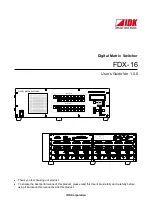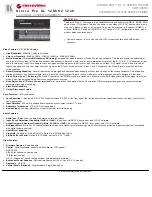
2 Standby online S4810 S4810 4810-8-3-12-1447 64
3 Member online S4810 S4810 4810-8-3-12-1447 64
4 Member online S4810 S4810 4810-8-3-12-1447 64
5 Member not present
6 Member not present
7 Member not present
8 Member not present
9 Member not present
10 Member not present
Virtual IP
You can manage the stack using a single IP, known as a virtual IP, that is retained in the stack even after a
failover.
The virtual IP address is used to log in to the current master unit of the stack. Both IPv4 and IPv6
addresses are supported as virtual IPs.
Use the following command to configure a virtual IP:
Dell(conf)#virtual-ip {ip-address |
ipv6–address | dhcp}
Failover Roles
If the stack master fails (for example, is powered off), it is removed from the stack topology.
The standby unit detects the loss of peering communication and takes ownership of the stack
management, switching from the standby role to the master role. The distributed forwarding tables are
retained during the failover, as is the stack MAC address. The lack of a standby unit triggers an election
within the remaining units for a standby role.
After the former master switch recovers, despite having a higher priority or MAC address, it does not
recover its master role but instead takes the next available role.
To view failover details, use the
show redundancy
command.
MAC Addressing on S-Series Stacks
The S-Series has three MAC addresses: the chassis MAC, interface MAC, and null interface MAC.
All interfaces in the stack use the interface MAC address of the management unit, and the chassis MAC
for the stack is the master’s chassis MAC. The stack continues to use the master’s chassis MAC address
even after a failover. The MAC address is not refreshed until the stack is reloaded and a different unit
becomes the stack manager.
NOTE: If the removed management unit is brought up as a standalone unit or as part of a different
stack, there is a possibility of MAC address collisions.
A standalone is added to a stack. The standalone and the master unit have the same priority, but the
standalone has a lower MAC address, so the standalone reboots. In the second example, a standalone is
added to a stack. The standalone has a higher priority than the stack, so the stack (excluding the new
unit) reloads.
Example of Adding a Standalone with a Lower MAC Address to a Stack
----------STANDALONE BEFORE CONNECTION---------------
Standalone#show system brief
956
Stacking
Summary of Contents for S4820T
Page 1: ...Dell Configuration Guide for the S4820T System 9 8 0 0 ...
Page 282: ...Dell 282 Control Plane Policing CoPP ...
Page 622: ...Figure 81 Configuring Interfaces for MSDP 622 Multicast Source Discovery Protocol MSDP ...
Page 623: ...Figure 82 Configuring OSPF and BGP for MSDP Multicast Source Discovery Protocol MSDP 623 ...
Page 629: ...Figure 86 MSDP Default Peer Scenario 2 Multicast Source Discovery Protocol MSDP 629 ...
Page 630: ...Figure 87 MSDP Default Peer Scenario 3 630 Multicast Source Discovery Protocol MSDP ...
Page 751: ...10 11 5 2 00 00 05 00 02 04 Member Ports Te 1 2 1 PIM Source Specific Mode PIM SSM 751 ...
Page 905: ...Figure 112 Single and Double Tag First byte TPID Match Service Provider Bridging 905 ...
Page 979: ...6 Member not present 7 Member not present Stacking 979 ...
Page 981: ...storm control Storm Control 981 ...
Page 1103: ...Figure 134 Setup OSPF and Static Routes Virtual Routing and Forwarding VRF 1103 ...
















































